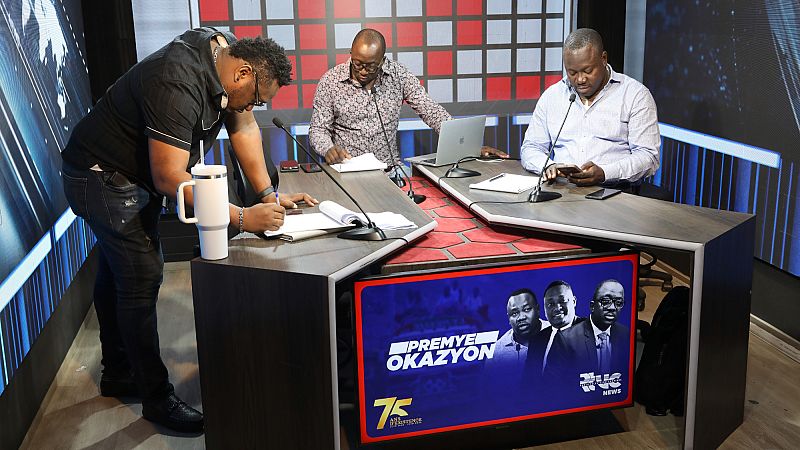Journalists in Haiti defy bullets and censorship to cover unprecedented violence

Donning a bulletproof vest emblazoned with “PRESS” on the front is a dangerous move in Haiti now. What used to serve as a symbolic and physical shield has now become a target.
Haiti's journalists are dodging bullets, defying censorship, and setting personal struggles aside as they document the downfall of Haiti’s capital and beyond.
Jean-Jacques Asperges is a radio journalist in one of the world’s most dangerous places to be a reporter.
Now, Asperges, his wife, and their two children are forced to sleep on the floor of a soiled and overcrowded makeshift shelter alongside thousands of other Haitians who have also been left homeless by gang violence.
Flooding is a constant danger in the shelter.
“I now record rain leaks and post them on social media to show what we have to endure. That is how I contribute, " said Asperges.
Having lost all his work equipment, Asperges relies solely on his phone, but he remains undeterred like dozens of other journalists in Haiti who are under attack like never before thanks to a surge in violence blamed on powerful gangs that control 85% of Port-au-Prince.
In March, heavily armed gangs attacked at least three TV and radio stations. The buildings were already abandoned because of previous violence, but gunmen stole equipment that had been left behind.
The Nouvelliste, Haiti’s oldest independent newspaper, had to abandon their printing presses downtown when gangs took over the area.
"We had to move from downtown because there were bullets flying around us all the time, " said Max Chauvet, director of operations at Le Nouvelliste, Haiti’s oldest independent newspaper.
Gangs sent an even deadlier message on Christmas Eve, when they opened fire on journalists covering the failed reopening of Haiti’s largest public hospital, saying they had not authorized its reopening.
Two journalists were killed and at least seven others were injured, including Asperges, who was shot in the stomach. It was the worst attack on reporters in Haiti in recent history.
Haitians increasingly distrust the media, accusing local journalists of working for gangs.
Meanwhile, gang members have taken to social media to threaten journalists.
One gang leader said he would kidnap radio reporters and ensure they won’t ever talk into a microphone again, while another threatened a talk show host based outside of Haiti, saying that if he ever set foot in the country, it would be the last time he would do so.
As a result, Haiti’s Online Media Collective has advised that journalists not cover incidents involving armed groups.
“We sent a note to let journalists know they are not to go where there is gang activity,” said Obest Dimanche, the collective’s spokesperson.
But given the persistent attacks by heavily armed gangs in the capital and beyond, most journalists disregard that advice.
They travel in packs and zoom around on motorcycles through Port-au-Prince’s hilly neighborhoods, ducking in unison when shots are fired.
At the end of the day, they check in on each other to ensure everyone returned safely home.
Gangs control an estimated 85% of Port-au-Prince and keep launching attacks to seize even more territory.
Jean Daniel Sénat, a journalist at Le Nouvelliste and Magik9 radio station, lamented how journalists no longer have access to many neighborhoods in the capital because of gang violence: “The biggest challenge is not to be able to move around freely. To go to the city to report and not have access to the information from the neighborhoods.”
On March 13, Haiti’s prime minister condemned the attack on the building that once housed Radio et Télévision Caraïbes, the country’s oldest radio station, and pledged to protect media institutions.
“It was another attempt to shut down the press and against the population crying for social justice,” said Richecarde Celestin, radio journalist at Télévision Caraïbes.
Founded in 1949, the station has reported on Haiti’s tumultuous history: its coups, dictatorships and first democratic elections. Located on Rue Chavannes, the station’s former headquarters were considered a "heritage monument" by some who worked there.
According to UNESCO, at least 21 journalists were reported killed from 2000 to 2022 in Haiti, with nine killed in 2022, the deadliest year for Haitian journalism in recent history.
The New York-based Committee to Protect Journalists reported one journalist killed in 2023 and two more in 2024.
Other journalists have fled Haiti, where attacks and killings are rarely solved.
Haiti ranks as the country most likely to let journalists’ murders go unpunished, according to a 2024 CPJ report.
Since 2019, seven killings remain unsolved.
Today

